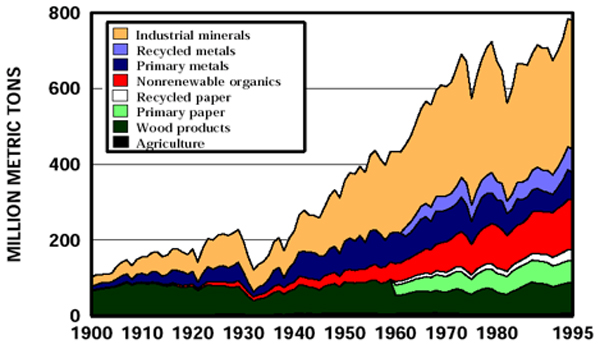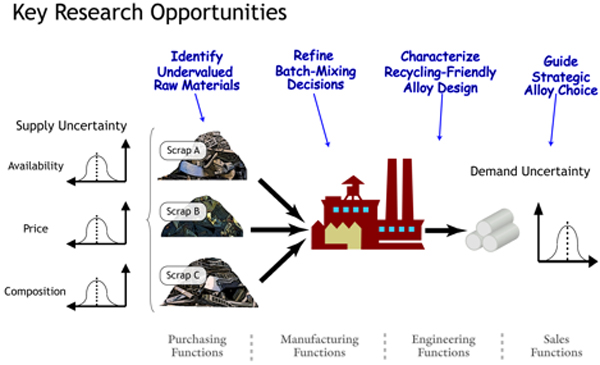Research: Mapping the Broader Implications of Materials Design
Environmental Performance
It is estimated that, in the US, total consumption of material resources has topped 60 kg per person per day. (Ayres 2003) While the average consumption of the rest of the world lags the United States by nearly an order of magnitude, it is growing at twice the rate. (Matos 1998) While these estimates are fraught with uncertainty, they clearly point to one of the significant challenges that confront engineers and scientists of the 21st century: how to deal with the deleterious effects associated with an unprecedented consumption of material resources. Concern over this issue is no longer limited to the isolated activist or green consumer. Firms, governments, and financial markets are all reorienting their approaches to industrial activity to account for environmental impact. Moving forward, materials technologies will also be judged by the burden they engender. (Bras 1997, Wegst and Asbhy 2002, Apelian 2007) To address this, a second focus of my research has been on developing tools to better characterize one specific aspect of environmental performance: recyclability.
Like cost, recyclability seems like a simple property, but in fact is dependent on the convolved characteristics of material, product, and recycling system. To deal with this challenge, Dr. Kirchain's group and a few groups globally have developed mathematical programming and simulation models that can project the potential to recycle for arbitrary combinations of raw materials and desired alloy products. (van Schaik 2004; Reuter 2006; Rong 2008) Dr. Kirchain's group has specifically demonstrated the potential for such tools to identify strategic opportunities to increase recyclability through changes in raw material sourcing, alloy-product matching, and alloy compositional modification.

Raw materials consumption within the US, 1900-1995. Excludes food, fuel, stone, sand, and gravel. (G. Matos & L. Wagner, "Consumption of Materials in the US", Ann Rev En Env, 1998, v. 23)

One technological strategy being explored to improve recyclability of many materials is sorting to improve scrap homogeneity. Although sorting is technically advantageous, its net economic value is unclear. Dr. Kirchain's group has developed a coupled sorting and alloy production model to quantify that value and how it is affected by sorter efficiency and operational context. For a specific technology, the group has demonstrated that although improved sorter efficiency always improves cost and scrap use, it does not always translate into increased sorter utilization.
Considering Uncertainty
In an effort to make these models more reflective of real-world operations, Dr. Kirchain's group has developed and implemented methods to incorporate the effects of uncertain demand and uncertain scrap composition into the decision process. In both cases, they learned that scrap use could be increased through the use of such stochastic models compared against conventional deterministic analyses. In the case of uncertain demand, this occurs because of the previously unrecognized hedging value of scrap. For composition, it emerges because traditional models do not manage variation by building up "scrap portfolios". Currently, the focus is on generalizing these models so that they can be used for any materials recovery system (e.g., polymers, paper, glass) and even for the primary production of numerous biological materials (e.g., collagen, rubber).
Recycling Systems
Complementing the facility level modeling efforts around light metals, Dr. Kirchain's group is carrying out a parallel research effort studying the performance of material recovery systems for complex durable goods (CDGs), most prominently end-of-life electronics. The initial focus of this work has been to characterize quantitatively the resource sustainability of such systems. Initial studies of six recycling facilities and the papers that followed developed novel, generalizable metrics of resource efficiency. Additionally, we have developed a generalizable model of a material recovery system for CDGs. This model can be used to explore the implications of policy and architectural decisions in terms of expected recovery and cost.
Selected Publications
Recyclability
R Kirchain and A Cosquer, "Strategies for Maintaining Light Metal Reuse: Insights from Modeling of Firm-Wide Raw Materials Availability and Demand", Resources, Conservation, and Recycling, Vol. 51, Iss. 2, 2007. pp. 367-396.
doi: 10.1016/j.resconrec.2006.10.005
G Gaustad, P Li, and R Kirchain, "Modeling Methods for Managing Raw Material Compositional Uncertainty in Alloy Production", Resources, Conservation, and Recycling, Vol. 52, Iss. 2, 2007. pp. 180-207.
doi: 10.1016/j.resconrec.2007.03.005
P Li, S Guldberg, HO Riddervold and R Kirchain, "Identifying Economic and Scrap Reuse Benefits of Light Metals Sorting Technologies", Proceedings of the Annual Meeting of TMS: EPD Congress 2005, San Francisco, 2005, pp 37-51.
The paper summarizing this work was selected as a Featured (Best) Paper at the TMS Annual Meeting 2005 in San Francisco, CA, one of seven out of 2500 papers.
P Li and R Kirchain, "Modeling Scrap Sourcing Decisions Given Uncertain Demand", Proceedings of the Annual Meeting of TMS: Light Metals Division, San Francisco, 2005, pp 849-854.
G Gaustad, S Das, and R Kirchain, "Identifying Scrap Friendly Alloys Using Chance Constrained Modeling", Proceedings of the Annual Meeting of TMS: Light Metals Division, Orlando, FL, February 25-March 1, 2007, pp. 1153-1160.
In 2006, this work was awarded the TMS Recycling Technology Award.
G Gaustad, R Peterson, and R Kirchain, "Modeling Methods to Guide Recycling Friendly Alloy Design: The Impact of Compositional Data Structure", Proceedings of the Annual Meeting of TMS: 9th Global Innovations Symposium - Trends in Integrated Computational Materials Engineering for Materials Processing and Manufacturing, New Orleans, LA, March 9-13, 2008, pp. 263-270.
Recycling Systems
J Gregory and R Kirchain, "A Framework for Evaluating the Economic Performance of Recycling Systems: A Case Study of North American Electronics Recycling Systems", accepted to Environmental Sciences and Technology, ASAP article released August 13, 2008, 9 pages.
doi: 10.1021/es702666v
J Gregory and R Kirchain, "Eco-Efficient Recycling Alternatives for End-of-Life Cathode Ray Tubes", Proceedings of the Annual Meeting of TMS: Light Metals Division, San Antonio, 2006, pp. 909-918.
J Gregory, J Atlee, and R Kirchain, "Driving Eco-Efficiency-Informed Decisions: A Process-Based Model of End-of-Life Electronics Recycling", Proceedings of IEEE International Symposium on Electronics and the Environment, San Francisco, 2006, pp.138-143.
J Dahmus, S Fredholm, E Olivetti, J Gregory, and R Kirchain, "Modeling the Economic and Environmental Performance of Recycling Systems", Proceedings of the IEEE International Symposium on Electronics and the Environment, San Francisco, CA, May 19-22, 2008, 6 pages.
S Fredholm, J Gregory, and R Kirchain, "Characterizing Architectural Options for Electronic Waste Recycling Systems", Proceedings of the IEEE International Symposium on Electronics and the Environment, San Francisco, CA, May 19-22, 2008, 6 pages.
E Olivetti, J Gregory, and R Kirchain, "Original Equipment Manufacturer End-of-Life Equipment Collection Metrics", Proceedings of the IEEE International Symposium on Electronics and the Environment, San Francisco, CA, May 19-22, 2008, 6 pages.
Environmental Metrics
F Field, R Kirchain and J Clark; "Life Cycle Assessment and Temporal Distributions of Emissions: Developing a Fleet-Based Analysis", Journal of Industrial Ecology, Vol. 4, Iss. 2, 2001, pp. 71-91.
doi: 10.1162/108819800569816
J Atlee and R Kirchain, "Operational Sustainability Metrics Assessing Metric Effectiveness in the Context of Electronics-Recycling Systems", Environmental Science and Technology, Vol. 40, Iss. 14, 2006, pp. 4506-4513.
doi: 10.1021/es050935l
E Alonso, F Field, J Gregory, and R Kirchain, "Material Availability and the Supply Chain: Risks, Effects, and Responses", Environmental Science and Technology, Vol.41, Iss. 19, 2007. pp. 6649-6656.
doi: 10.1021/es070159c
AN Allen, S Das, F Field, and R Kirchain, "Robustness of Materials Selection Decisions Using Various Life-Cycle Assessment Methods", Proceedings of the TMS Conference on Materials Science and Technology (MS&T07), Detroit, Michigan, September 16-20, 2007, pp. 55-66.
Kirchain Home | Motivation | Research - Economic | Research - Environmental | Bibliography
